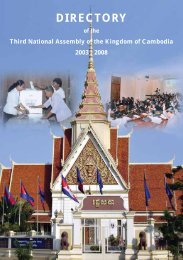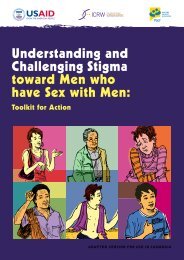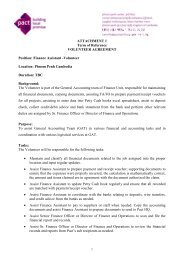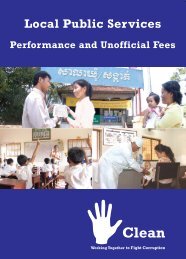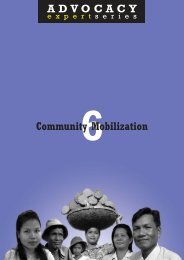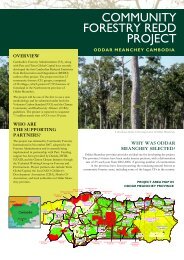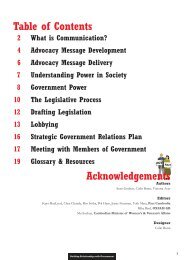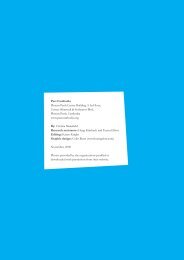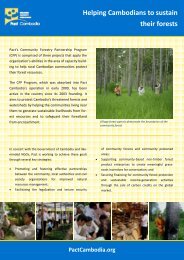Advocacy in Cambodia: Increasing Democratic ... - Pact Cambodia
Advocacy in Cambodia: Increasing Democratic ... - Pact Cambodia
Advocacy in Cambodia: Increasing Democratic ... - Pact Cambodia
You also want an ePaper? Increase the reach of your titles
YUMPU automatically turns print PDFs into web optimized ePapers that Google loves.
Case Studies<br />
appropriate market-based worker wages.<br />
The <strong>Cambodia</strong>n Labor Organization (CLO)<br />
also supports trade unions with technical<br />
assistance, negotiation tra<strong>in</strong><strong>in</strong>g, <strong>in</strong>formation on<br />
the labor code, and tra<strong>in</strong><strong>in</strong>g on how to establish<br />
and ma<strong>in</strong>ta<strong>in</strong> unions. The presence of support<br />
agencies has contributed significantly to the<br />
development of trade unions <strong>in</strong> <strong>Cambodia</strong>.<br />
Use of Media and Influenc<strong>in</strong>g Buyers<br />
The labor movement tends to get wide<br />
coverage <strong>in</strong> the press, generally receiv<strong>in</strong>g an equal<br />
amount of attention from the English and Khmer<br />
language press. International organizations have<br />
tra<strong>in</strong>ed local union leaders <strong>in</strong> the use of the media.<br />
While local leaders’ skills are still limited, some<br />
unions have learned to dissem<strong>in</strong>ate <strong>in</strong>formation<br />
through e-mail to sweatshop advocacy groups (e.g.<br />
U.S. Students Aga<strong>in</strong>st Sweatshops), ask<strong>in</strong>g them<br />
to call or write buyers regard<strong>in</strong>g labor law and<br />
rights violations. The usefulness of this strategy is<br />
questionable however, and unions achieve greater<br />
success establish<strong>in</strong>g direct relations with buyers<br />
<strong>in</strong> New York or Hong Kong.<br />
Around the world, trade unions apply<br />
pressure on mult<strong>in</strong>ational corporate buyers by<br />
mobiliz<strong>in</strong>g public support for human rights.<br />
Companies have responded by apply<strong>in</strong>g “Codes of<br />
Conduct” to production processes to protect<br />
themselves from consumer pressures (coverage of<br />
issues <strong>in</strong> the “Codes of Conduct” tends to be<br />
limited). Though still <strong>in</strong> its early stages,<br />
<strong>Cambodia</strong>n garment unions are beg<strong>in</strong>n<strong>in</strong>g to<br />
develop direct relations with buyers. For example,<br />
the <strong>Cambodia</strong> Daily covered a story <strong>in</strong>volv<strong>in</strong>g the<br />
Infong Garment Company, <strong>in</strong> which a union called<br />
the company’s buyer about a problem, which the<br />
buyer then pressured the manager to fix.<br />
Impact of <strong>Advocacy</strong> <strong>in</strong> the Labor<br />
Movement<br />
With a history of only five years, the<br />
<strong>Cambodia</strong>n labor movement is still young and<br />
relatively weak. That notwithstand<strong>in</strong>g, the sector<br />
benefits from the support of <strong>in</strong>ternational agencies<br />
with vast organiz<strong>in</strong>g and union build<strong>in</strong>g<br />
experience. It is also challenged by an unequal<br />
distribution of power between workers and<br />
owners. Companies have a vested <strong>in</strong>terest <strong>in</strong><br />
keep<strong>in</strong>g wages low and – perhaps due to the fact<br />
that they are <strong>in</strong> large part not <strong>Cambodia</strong>n<br />
nationals – factory owners do not appear<br />
<strong>in</strong>terested <strong>in</strong> improv<strong>in</strong>g work<strong>in</strong>g conditions of<br />
their own accord. The presence of resource-poor<br />
government agencies and resource-rich factory<br />
owners comb<strong>in</strong>es to present a daunt<strong>in</strong>g challenge<br />
for labor unions to promote the rights of workers,<br />
a situation that is currently (but not <strong>in</strong>def<strong>in</strong>itely)<br />
balanced by outside pressures.<br />
Policy<br />
From the legislative and policy perspective,<br />
provisions for garment workers <strong>in</strong> <strong>Cambodia</strong> have<br />
improved considerably s<strong>in</strong>ce 1996. As mentioned<br />
earlier, national legislation and m<strong>in</strong>isterial<br />
proclamations cover a range of issues from seat<strong>in</strong>g<br />
provisions and water supply for workers to the<br />
m<strong>in</strong>imum wage and the protection of union<br />
leaders. The presence of U.S. quotas and the ILO<br />
monitor<strong>in</strong>g program are understood to play a<br />
significant role <strong>in</strong> pressur<strong>in</strong>g the <strong>Cambodia</strong>n<br />
Government to make legislative and policy<br />
changes.<br />
There is a general consensus with<strong>in</strong> the trade<br />
union movement that enforcement of labor<br />
policies is almost non-existent, particularly on<br />
important issues like of freedom of association,<br />
forced overtime, and wage discrepancies.<br />
Although it is acknowledged that external pressure<br />
has a positive effect on work<strong>in</strong>g conditions, the<br />
general perception is that companies do not abide<br />
by the law and the M<strong>in</strong>istry of Labor does not<br />
enforce it. The trade union movement considers<br />
the M<strong>in</strong>istry’s dispute resolution mechanism<br />
someth<strong>in</strong>g that most often follows the will of<br />
employers.<br />
There is agreement that the ILO monitor<strong>in</strong>g<br />
program will help <strong>in</strong> improv<strong>in</strong>g factory work<strong>in</strong>g<br />
conditions, although there is apparently some<br />
discrepancy between the ILO and government<br />
monitor<strong>in</strong>g reports. ILO officials themselves<br />
<strong>in</strong>dicate however, that improvements are due to<br />
leverage wielded by quotas rather than because<br />
of government enforcement. Buyer adherence to<br />
a code of conduct is another effective enforcement<br />
mechanism and most concerned buyers have their<br />
own compliance officers stationed <strong>in</strong> factories.<br />
However, these codes are not legally b<strong>in</strong>d<strong>in</strong>g and<br />
enforcement is not guaranteed.<br />
It is generally thought that the government<br />
has agreed to establish policies and conduct<br />
consultation with unions because of external<br />
pressure and not due to political will. The<br />
government’s relationship with trade unions<br />
appears antagonistic and the government may<br />
perceive the development of a strong labor<br />
movement as an <strong>in</strong>hibitor of corrupt practices.<br />
Enlarg<strong>in</strong>g the <strong>Democratic</strong> Space<br />
With<strong>in</strong> the context of the garment labor<br />
movement, democratic space encompasses<br />
freedom of association, freedom of expression,<br />
and the right to participate <strong>in</strong> policy-mak<strong>in</strong>g. S<strong>in</strong>ce<br />
the establishment of the first union <strong>in</strong> 1996 and<br />
the enactment of the Labor Law <strong>in</strong> 1997, these<br />
64



